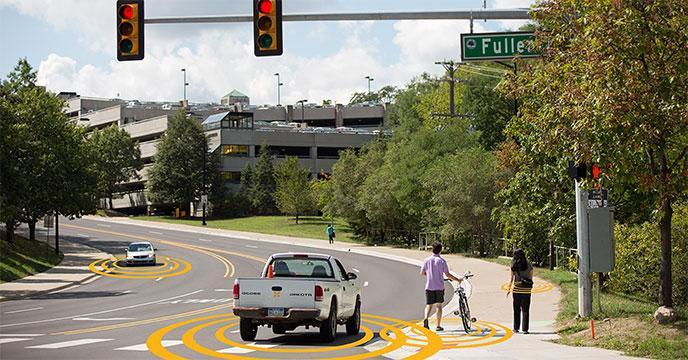Enhancing Safety on Ann Arbor Streets With C-V2X
Qualcomm Technologies is supporting UMTRI with its Smart Intersection project to demonstrate improved automotive and pedestrian safety using C-V2X technology.

The original testbed for validating improved safety with connected vehicles, UMTRI, is bringing Ann Arbor to the next level with the Smart Intersection project. The U.S. Department of Transportation (USDOT) has announced a $9.9M award that will be matched by the project participants, including Qualcomm. In this project UMTRI is deploying a network of more than 20 smart intersections throughout the city and a fleet of vehicles that communicate via Cellular-to-Everything (C-V2X) communications technology.
Qualcomm Technologies is proud to support UMTRI’s Advanced Transportation and Congestion Management Technologies Deployment Program for the Smart Intersections: Paving the Way for a National Connected and Automated Vehicles (CAV) Deployment project and believes that integrating C-V2X is a pivotal step toward demonstrating the robust potential for safety and convenience of connected and automated vehicles.
Building on success
In 2012, UMTRI and the U.S. DOT launched the Safety Pilot Model Deployment (SPMD), a $30 million project to assess the effectiveness of connected vehicle safety technology at reducing crashes. The project spanned three years and incorporated over 2,800 vehicles and 73 lane-miles of instrumented roadway. The Safety Pilot study validated the effectiveness of safety critical V2X communications.
To continue momentum, the infrastructure footprint was expanded to the entire 27-square miles of the city of Ann Arbor. This upgraded deployment, known as the Ann Arbor Connected Vehicle Test Environment (AACVTE), is currently the world’s largest operational, real-world deployment of connected vehicles and infrastructure. Led by UMTRI and its partners, AACVTE a great example for nation-wide implementations and a stepping-stone to achieving the U.S. DOT’s vision for a national deployment of connected vehicles and infrastructure.
Qualcomm Technologies’ role
As part of the Ann Arbor Smart Intersections Project, QTI is scoped to support the integration of C-V2X technology into roadside infrastructure and vehicles for direct communication. C- V2X, the latest technology to be approved by the Federal Communications Commission (FCC) for vehicle-to-everything (V2X) safety communication, communicates directly with other vehicles and infrastructure without necessarily using a SIM card or connection to a cellular network.
C-V2X direct communication mode is designed to offer vehicles low latency communications for Vehicle-to-Vehicle (V2V), Vehicle-to-Roadside Infrastructure (V2I) and potentially Vehicle-to-Pedestrian (V2P) by operating on designated and harmonized 5.9 GHz ITS spectrum. C-V2X is also designed to be globally compatible with 5G and complements other Advanced Driver Assistance Systems (ADAS) sensors, such as cameras, radar, and LIDAR.
In addition to providing technical support for the C-V2X implementations, QTI is proposed to provide Qualcomm Snapdragon Automotive 5G Platforms with integrated C-V2X direct communications technology solutions to be used in vehicles and infrastructure for advanced research. The 5G C-V2X communications may further improve connected vehicle features and help pave the way for connected autonomous vehicles.
We are excited to begin work with UMTRI and its partners to demonstrate C-V2X’s effectiveness, which could help accelerate the adoption of new cellular technologies for connected and automated vehicles. QTI looks forward to deploying next-generation technologies, such as 5G, designed to enhance safety and mobility on Ann Arbor roadways. Deploying C-V2X today and integrating with 5G in the future helps the automotive industry advance its vision for safer, highly connected, and smarter transportation.

